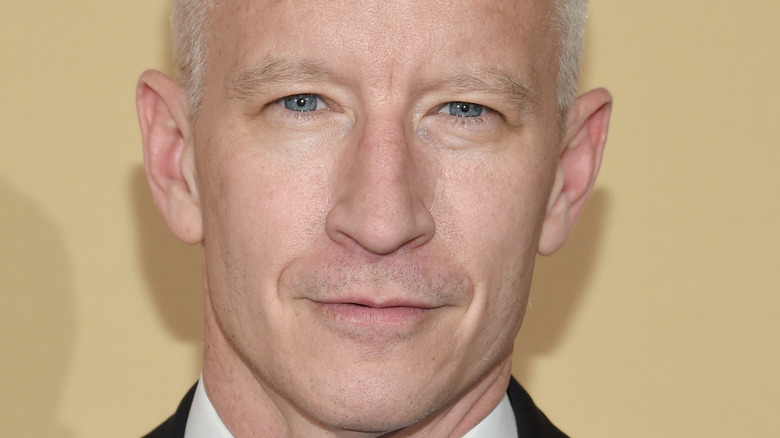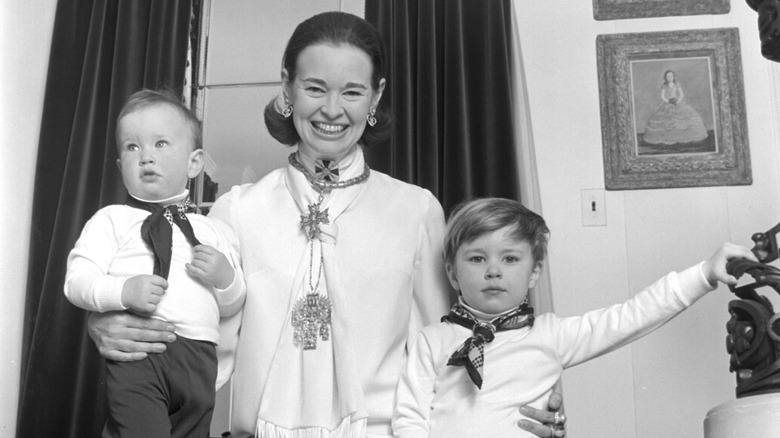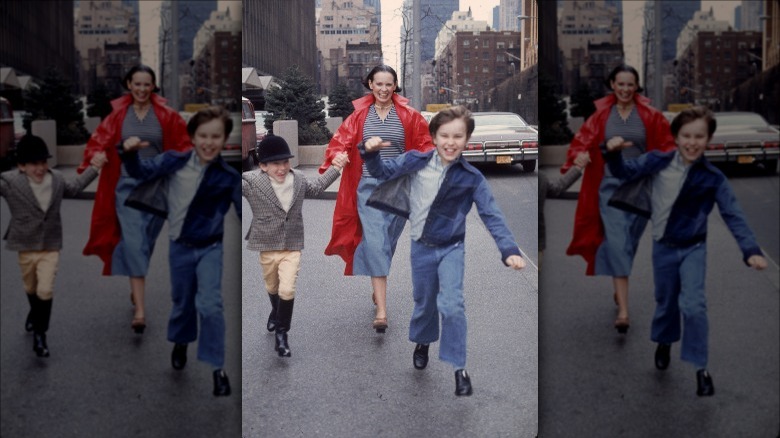Why Anderson Cooper Was Never The Same After His Brother's Death
The following article includes mentions of suicide.
As a member of the Vanderbilt family, the suicide of Carter Cooper was splashed across headlines from coast to coast on July 22, 1988. The eldest son of the late Gloria Vanderbilt and Wyatt Emory Cooper suffered from depression, a condition for which he was receiving treatment at the time, the New York Times reported. He was 23, two years older than his brother, Anderson Cooper. Vanderbilt never believed Carter's death was premeditated.
Instead, the heiress and artist believed his death was brought on by a new asthma medication that triggered a psychotic episode, as she detailed in her 1996 book "A Mother's Story" (via the New York Times). According to Vanderbilt, Carter had been acting perfectly normal until his afternoon nap, when he woke up looking disoriented. Vanderbilt and Anderson's lives were never the same. "The most terrible word in the English language, 'closure,'" she told People in 2016. Anderson agreed with his mother. "It doesn't exist. There's no such thing," he added.
That day, Anderson and Vanderbilt suddenly became the last two members of their family. A decade before his brother's death, Anderson's father died at the hospital while receiving treatment for a heart condition at the age of 50, the New York Times reported. Death seemed to define Anderson's early years. "These are the two events that affected him at gut level," Vanderbilt told New York magazine in 2005. Losing Carter at 21 impacted not only Anderson's personal life but also left a mark on his professional choices.
If you or anyone you know is having suicidal thoughts, please call the National Suicide Prevention Lifeline by dialing 988 or by calling 1-800-273-TALK (8255).
The death of Anderson Cooper's brother affected his career path
Anderson Cooper had just concluded his junior year at Yale when Carter Cooper died, New York magazine noted. "At first he didn't want to go back; he wanted to stay with me to protect me," Gloria Vanderbilt said. "But of course I wouldn't let him." Up until then, the political science student had no clear vision of where to take his career. But Carter's death pushed him toward journalism.
In 1992, Anderson headed to East Africa with nothing but an amateur camera and a fake press pass in an attempt to become a reporter. At least that's what he told everyone. "The only thing I really knew is that I was hurting and needed to go someplace where the pain outside matched the pain I was feeling inside," he wrote in a 2003 essay for Details magazine (via CNN). "Somalia seemed a good place to start."
Anderson's senior year had been marked by grief. Not only did he miss Carter, but he was also afraid. "I'd spent most of my time trying to figure out what had happened, and I worried that whatever impulse drove my brother might be lurking out there, somewhere, waiting for me," the CNN anchor detailed. Vanderbilt believed the tragedy that befell her family armed Anderson with the right skills to excel in journalism. "When he became a reporter, it enabled him to do this with compassion and maturity way beyond his years," she told New York.
Anderson Cooper is still affected by the loss
More than three decades have passed since Anderson Cooper's brother Carter died, but it stayed with him his whole life. "I think about my brother, I think about his death every single day," Anderson told ABC News' Dan Harris on the "10% Happier" podcast in 2017. "To this day [it] is so shocking to me. It's still — there are days where it's just like a punch in the gut."
Anderson was never able to process what happened. "He was 23 at the time, two years older than I was. I'd always considered us close, though now I'm not so sure," he wrote in the Details essay (via CNN). Not understanding has made coming to term with Carter's death that much more difficult. "It is very close to the surface still," he told Harris. "It's incredible to me that ... I've lived longer without him than I lived with him in my life. It is so bizarre to me."
The loss of his brother 10 years after that of his father strengthened Anderson's relationship with Gloria Vanderbilt. "I think it obviously brought us together in ways and I think you can't help but come closer going through something like that, and, you know, it left us with each other," he told People. Following Carter's death, Vanderbilt and Anderson came to an unspoken agreement about their holidays plans that has remained unchanged. "From then on we've never done anything about Christmas," she explained.



